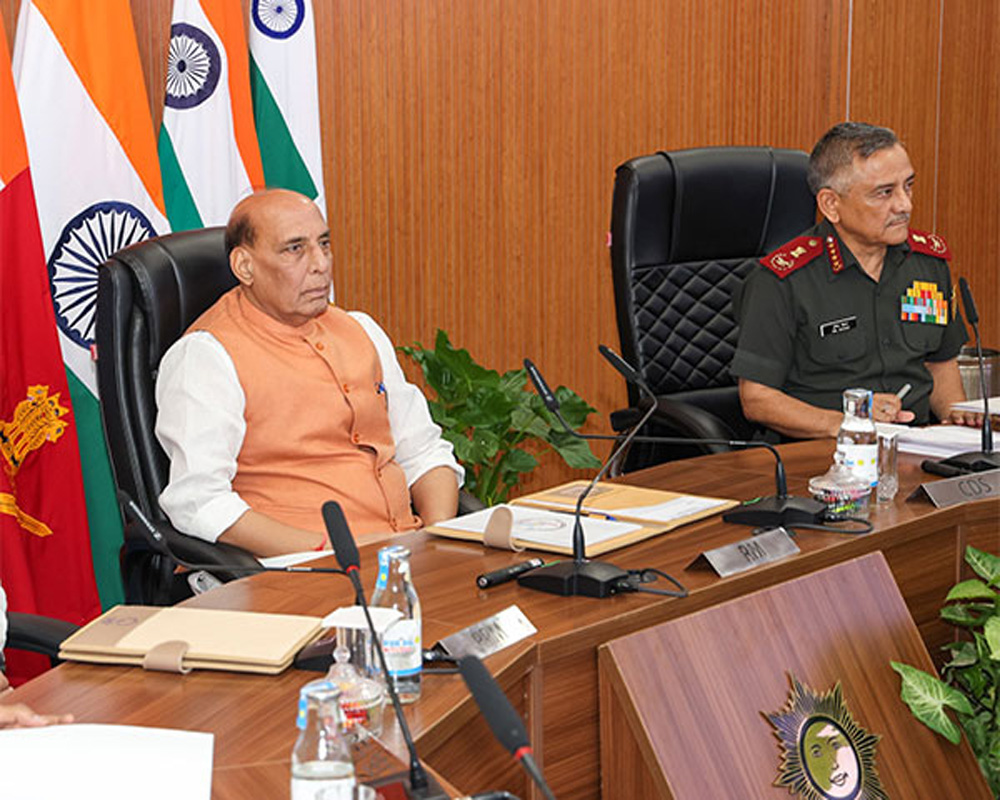India was left behind in terms of modern weapons and technology but it moved towards self-reliance in the defence sector at an "unprecedented" pace after the Modi government came to power, Defence Minister Rajnath Singh said on Thursday.
In an address at an event, Singh said modern warfare is changing rapidly and there is a need to adopt high-end technology to deal with future and national security challenges.
The defence minister exhorted scientists and engineers to gain command over critical technologies, such as artificial intelligence and quantum computing in tune with the changing times, and urged them to never forget India's heritage.
Singh was speaking at the Indian National Academy of Engineering's Annual Convention at IIT Delhi.
The defence minister emphasised that the niche technologies are going to impact almost every sector in a big way in the coming times.
"Right now, we are in the initial phase. Our aim should be to first gain command over these technologies, so that in the future, they can be used for the welfare of the people to fulfil their immediate basic needs," he said.
Singh pointed out that the world is continuously evolving, and the defence sector cannot remain untouched by this change.
He stated that earlier, due to some reasons, India was left behind in terms of modern weapons and technology, but ever since the Modi government came to power, the country has moved towards self-reliance in defence at an unprecedented pace, according to the defence ministry.
"Modern warfare is changing rapidly, therefore there is a need to adopt high-end technology. Towards this, we have brought out schemes like Innovations for Defence Excellence (iDEX) and Technology Development Fund (TDF) to bring out the talent of the youth, through which their as well as the nation's dreams can come true," he said.
The iDEX was launched in 2018 to create an eco-system to foster innovations and encourage technological development in the defence and aerospace sector.
Singh asserted that India is passing through a "defining moment" as it is exporting even those weapons which it once imported.
The defence minister credited this "revolutionary transformation" to the collective efforts of the public and private sectors, academia, and engineers and innovators.
He exuded confidence that the country will soon achieve a formidable technical edge in the global arena.
Singh lauded the role of IITs in the scientific development of the country in collaboration with the Defence Research and Development Organisation and called for establishing an even better organic relationship among the industry, research and development organisations and academia.
"In developed countries, academic campuses play an important role in progressing frontier technologies. There is a need to explore ways on how to co-opt IIT Delhi and similar institutions of higher scientific learning and excellence with the government's development campaign," he added.
"India is the youngest country at present. Our youth have the passion and the ability to innovate. Our government stands with them at every step."
Singh noted that the government has been supporting the youths in their quest for innovation and providing funds as per needs.
"Today, India has become a hub of innovation and start-ups, due to which we are continuously gaining technological prowess. We will always stand with our engineers and innovators. With our combined efforts, we will realise our dream of 'Aatmanirbhar Bharat' (self-reliant India)," he said.
The defence minister commended Indian National Academy of Engineering (INAE) for playing a "crucial role" in making India self-reliant.
By focusing on innovation, collaboration and modernisation, this institute has started a technological revolution in India, he said.
























